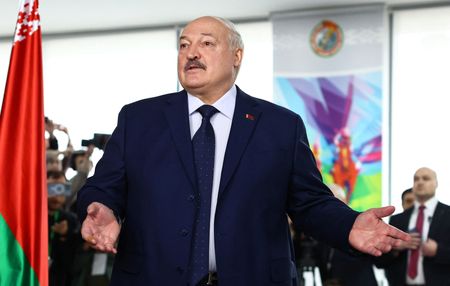By Nidal al-Mughrabi and Maayan Lubell
CAIRO/JERUSALEM (Reuters) – Tens of thousands of Palestinians streamed along the main roads leading north in Gaza on Monday, jubilant to be returning home after months of living in temporary shelter but fearing what might remain of their homes amid the bombed-out ruins.
Their return, which had been delayed at the weekend, went ahead after Hamas agreed to hand over three Israeli hostages later this week and Israeli forces began to withdraw from a main corridor across the enclave under the terms of an agreement on a ceasefire in the 15-month-long war.
In Israel, families of hostages waited anxiously for news of the fate of their loved ones.
Along a road running by Gaza’s Mediterranean shore, a mass of people, some holding infants in their arms or carrying bundles of belongings on their shoulders, trekked north on foot.
“It’s like I was born again and we were victorious again,” said a Palestinian mother, Umm Mohammed Ali, part of the miles-long throng that moved slowly up the coastal road.
Witnesses said the first residents arrived in Gaza City in the early morning after the first crossing point in central Gaza opened at 7:00 a.m. (0500 GMT). Another crossing opened around three hours later, letting in vehicles.
“My heart is beating, I thought I would never come back,” said Osama, 50, a public servant and father of five, as he arrived in Gaza City.
“Whether the ceasefire succeeds or not, we will never leave Gaza City and the north again, even if Israel would sent a tank for each one of us, no more displacement.”
Having been repeatedly displaced over 15 months of war, cheers erupted at shelters and tent encampments when families heard news that the crossings would be opened.
“No sleep, I have everything packed and ready to go with the first light of day,” said Ghada, a mother of five.
“At least we are going back home, now I can say war is over and I hope it will stay calm,” she told Reuters via a chat app.
Children in warm jackets and carrying backpacks walked hand in hand, men pushed the elderly in wheelchairs and families posed for photos as Hamas-hired officials in red vests directed them along the road.
DESTRUCTION
Around 650,000 Palestinians were displaced from northern Gaza during the war, which was triggered by Hamas’ Oct. 7, 2023 assault on southern Israel in which 1,200 people were killed and 251 taken hostage, according to Israeli tallies.
More than 47,000 Palestinians have since been killed in the Israeli assault on Gaza, according to the Gaza health ministry.
Many of those displaced have had to move several times as Israel designated parts of Gaza as humanitarian zones and then cleared them out before mounting bombardments and ground operations there.
Much of Gaza now lies in ruins. The Hamas-run Gaza government media office said returnees to the north need at least 135,000 tents and shelters as they try to reestablish their lives in the rubble-strewn landscape of their former homes.
HOPE
Under the terms of the ceasefire agreement, residents of northern Gaza were due to return at the weekend. But Israel said that Hamas had broken the deal by failing to release civilian female hostage Arbel Yehud and kept its forces in the Netzarim corridor that cuts across the enclave south of Gaza City.
Late on Sunday, Qatari mediators resolved the dispute after Hamas agreed to release Yehud, along with female soldier Agam Berger and another hostage on Thursday, two days before the next scheduled release of three more hostages on Saturday. Israel then gave the green light for a return to north Gaza from Monday morning.
Hamas has also provided a list of all hostages to be released during the first six-week phase of the ceasefire agreement, stating their condition.
On Monday, a Hamas official told Reuters the group had handed over to mediators a list that showed that 25 of 33 hostages scheduled for release in the first phase are alive. The figure of 25 included the seven hostages released since the truce began on Jan. 19.
Israel has confirmed the Hamas figures in the list – 25 are alive but eight were killed by Hamas, an Israeli government spokesman said.
The identities of who was dead and who was alive was not immediately confirmed, keeping families in a state of hope and dread.
Israeli authorities have previously said there are grave concerns about the lives of Shiri Bibas and her two sons, aged 4 years and 10 months when they were abducted from Kibbutz Nir Oz.
Her sister-in-law Ofri Bibas said the past few weeks have been agonizing for the family. Shiri’s husband, Yarden Bibas, is also hostage in Gaza but was taken separately from his family.
“We are waiting, amid a sea of rumours,” Ofri Bibas told Israel’s Public Broadcaster Kan. “We have no certainty and we are still clutching on to hope, hoping to see them here, together with Yarden.”
Hamas officials and ordinary Gazans have rejected a suggestion from U.S. President Donald Trump that Jordan and Egypt should take in Palestinians from the war-ravaged enclave, rekindling long-standing Palestinian fears about being driven permanently from their homes. Critics of Trump’s comments have said this would amount to “ethnic cleansing”.
According to the ceasefire accord, only unarmed people will be allowed to return north. Israel’s military warned Gazans not to carry weapons with them or approach Israeli troops anywhere.
Residents crossing back north said Egyptian security personnel were supervising the return of Palestinians in vehicles along the Salahuddin Road, the main thoroughfare running north to south, with Hamas police officers close by.
“At the Netzarim junction, young Egyptian army members are supervising the car X-ray machine and they are dealing with the returnees in a loving way…the whole process took a few minutes,” said Mustafa Ibrahim.
A private U.S. security firm will also take part in checks, an Israeli government spokesman said.
(Reproting and writing by Maayan Lubell in Jerusalem and Nidal al-Mughrabi in Cairo; Editing by Ros Russell and Angus MacSwan)
















